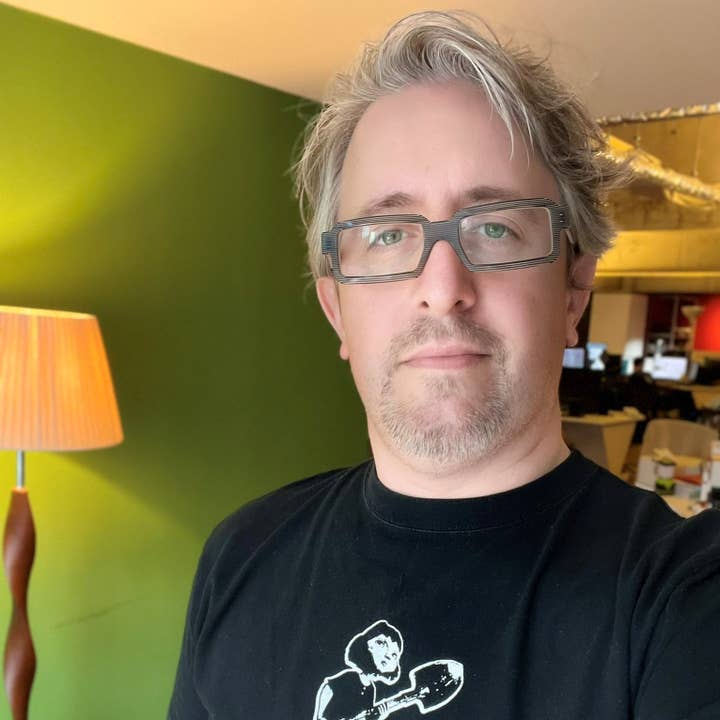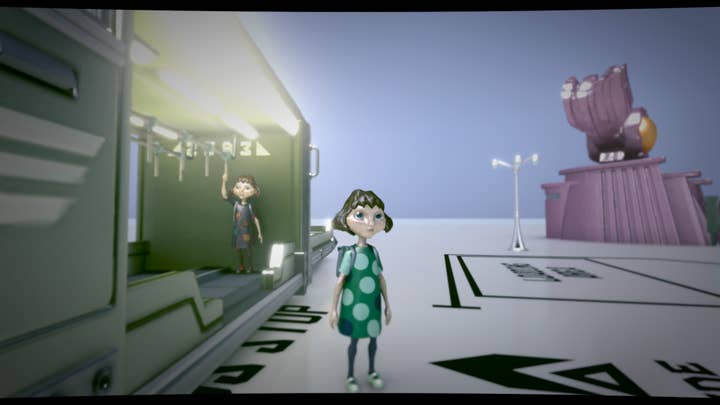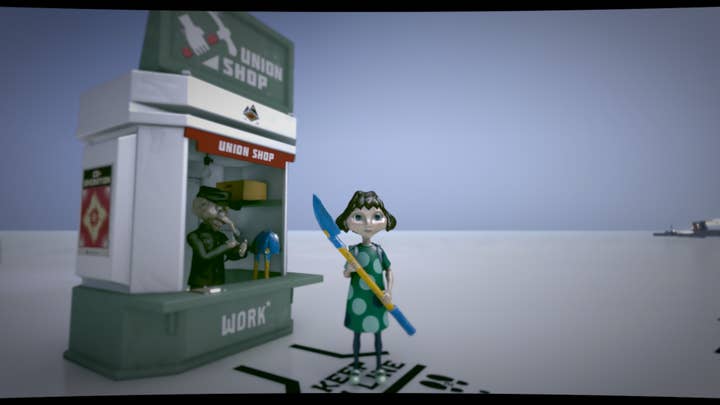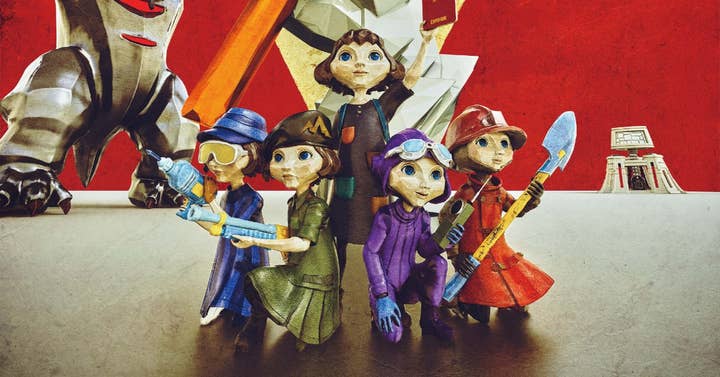A second chance for The Tomorrow Children
Q-Games' Dylan Cuthbert on reclaiming the IP, dropping free-to-play and pondering the future of the series
Towards the tail end of 2021, Q-Games accomplished something very rare in this industry: it had reclaimed its intellectual property, specifically for PS4 exclusive The Tomorrow Children.
In the announcement tweet, the Japan-based company described it as "a historical move by Sony Interactive Entertainment" and it's hard to argue with that. The game was originally published as a second-party title, funded by PlayStation, and it's typical for the platform holder to retain the IP rights in such a partnership.
The Tomorrow Children originally launched in October 2016. It was a title that defied simple genre classification: a free-to-play resource management and town building game, but with some social aspects and even some action, where you defend your town from attack using rocket launches, turrets and tanks.
Just over six months after it launched, Sony announced the title would be shut down.

It was a sad day for the Q-Games team, founder Dylan Cuthbert tells GamesIndustry.biz, if only because they were all still playing it.
"There are many times where a team makes a game and then doesn't want to play it again, but with The Tomorrow Children, we were actually playing it ourselves at home, and our wives and children were all playing it as well, and the decision for it to be shut down... It was very quick," he says.
"It was a free-to-play game, so it needed time to grow, and for us to work out how to monetise it properly. But that's the main reason it ended up being shut down, because we didn't really manage to monetise it. We weren't experienced in free-to-play, so that probably didn't help, but neither were Sony. We were still finding our way to earn from the players. Not in a manipulative way, we wanted to find a nice way to earn just enough to keep the game going."
Server costs were another factor, adding pressure to the need to monetise. Free-to-play games were rare on PlayStation at the time, and tapped into new audiences. Cuthbert says The Tomorrow Children saw huge influxes of players from territories like Saudi Arabia, Hungary, Turkey and Russia, but these players didn't necessarily spend much money on the game.
"We didn't work out a way to deal with that amount of new users," he says. "And it's just one of those unfortunate things; we had a lot of content planned, but the tide had just changed at Sony internally and they were moving away from free-to-play. They cancelled a whole bunch of free-to-play titles around that time, and were moving back to premium titles. We got caught up in that as well.
"Since the contract came through, we've treated this as almost like a hobby project. It's like I'm back in my bedroom again in the '80s"
"So, it's a perfect storm really, a mixture of all kinds of things that lined up in the wrong way."
Q-Games spent six months shutting the game down cleanly; for example, the last three months dropped all monetisation so players could get more out of the game in the time they had left. But after the game closed, Cuthbert noticed something strange: fans were still posting their in-game pictures, as if they were still playing it. Even two to three years later, the community was still sharing their old screenshots, which prompted Cuthbert to investigate whether The Tomorrow Children could be revived at all.
He began by reaching out to Allan Becker, PlayStation's head of Japan Studios at the time, but the IP rights were spread across the global PlayStation group so granting them to Q-Games was beyond Becker's power. Another window of opportunity opened when Double Fine's Greg Rice joined as head of PlayStation Creators. Cuthbert's past relationship with Rice, built through Q-Games' appearances at indie games festival Day of the Devs (which Double Fine helped to organise), encouraged him to reach out.
"I said, 'Well, you're in this new role. Can you just have a poke around and as I'm a PlayStation Creator, see if you can get one of my creations to come back to me in some way? Even if Sony keep the IP and just fund it a little bit to get this new version going, or anything like that.'"

Rice spent a few months exploring but hit a barrier: the company's general policy was that IP stays within Sony. Cuthbert thanked him for trying, and let the matter rest... until Hermen Hulst became head of PlayStation Studios. The two had known each other briefly, meeting a few times during the development of The Tomorrow Children.
"I messaged him on the day that he got this job, and said, 'Congratulations on the job, and also, if you see The Tomorrow Children lying around, could you just pass it along to me?' And he politely said, 'Well, we'll see,' but I thought nothing would come of that."
A little under two years ago, Cuthbert received an email from Rice: there had been some movement with regards to The Tomorrow Children IP.
"You can put even more passion into a game that you fully own. You're going to think more [about TV adaptations]. But you're not going to if a publisher owns the IP"
The Q-Games team began investigating the things that would need to happen in order to fully regain ownership of the game. The IP rights would just be the start; the studio also needed to ensure anything that had been licensed for the game was still usable -- music, animation libraries, voice performances, the list went on.
"There were all these extra moving parts," says Cuthbert. "So, it took about eighteen months to deal with all that, and also to deal with the terms as well, to whittle down the terms of the contract."
About six months before the IP was officially transferred back, Cuthbert assigned a couple of programmers to start working on reviving The Tomorrow Children. This was not a full-time project, with the programmers instead chipping away at it, not only to see if it was possible to get it up and running, but also to work out if it could run on a peer-to-peer basis, removing the need for servers and their associated costs. It was essentially a proof-of-concept project, and was actually finished around four months before the contract was finished, giving Q-Games a head start on the game's resurrection.
"Since the contract came through, we've treated this as almost like a hobby project," Cuthbert says, when asked whether The Tomorrow Children has disrupted other development within the studio. "I'm basically doing a lot of the programming, testing, and adding these new features, changes and balances. And it's fun. It really is like I'm back in my bedroom again in the '80s, and I'm just hacking away. It's a very unique situation, because I've got this game which is almost fully complete."
With the IP rights now held by Q-Games and work on the game's relaunch well underway, major changes are happening. In addition to making it peer-to-peer, the studio is also removing the free-to-play model and modifying the game accordingly.
"It means the game can be balanced a lot better, because we don't have to try and squeeze a bit of money out of the player at every opportunity," Cuthbert says. "We can just actually build the game properly, based on normal -- more normal, I suppose -- progression methods."
He continues: "I really think the [problem] was basically just the free-to-play thing. I think people, especially at that time, didn't like microtransactions in general. At the time as well, I saw many comments saying, 'If this game was just a one-time purchase, I'd buy it.' Loads of people said that."

There's no defined timeline on when the game might relaunch, but Cuthbert hopes to achieve this by the end of 2022 -- and not too late in the year, if possible. It will initially launch for PS4, although naturally it will run on PS5 as well. And the studio hopes to bring it to more platforms in future.
"It just depends on the reaction we get," he says. "If people forget the free-to-play stuff, the stigma of that back in the day, and take this as a new game, I think they will be pleasantly surprised, because it's a very rounded, very full game with lots and lots of features and content. It's just a cool place to go and play in."
"For other companies who are trying to do a similar thing, it's best to just persevere. It's not going to happen instantly"
Reclaiming the IP rights also opens up opportunities beyond the original game. Cuthbert already discussed the possibility of a sequel in past interviews, although he adds that nothing is set in stone. He even hints at the possibility of taking it into other forms of entertainment, should the chance arise.
"That whole world is interesting and rich, and actually has a strong backstory which isn't revealed that much in the current form of the game -- it was planned to be brought in bit by bit," he explains. "I would love to expand that world even more, and create a sequel that's a slightly different style of game."
He continues: "You can put even more passion into a game that you fully own, or at least that you fully own the IP of. You're going to think more like, 'So, if I wrote a script for TV for this world, maybe it might get taken up?' But you're not going to do that if a publisher owns the IP. You're not going to push yourself to that for no reason.
"Publishers should really be working, at least partially, on your behalf as a creator, because they're not creating it. They're not creating these worlds, this originality. I think it's good to maybe have that balance go back a little bit. And it has been. In the past ten years or so, it's completely different compared to, say, twenty years ago, where there would be zero chance of you being able to retain your IP or get it back."
Q-Games won't be the only studio out there in this situation, with one of its creations prematurely scrapped and the rights locked within the portfolio of its original publisher. The upcoming return of The Tomorrow Children is perhaps a source of encouragement for these developers, and to any seeking to reclaim their own IP, Cuthbert advises two things: gratitude and diplomacy.
"I was very grateful that Sony had funded that vision in the first place," he explains. "It was a pretty 'out there' vision and a crazy setting, and they were willing to experiment with it. So, at the time I wasn't really that fussy about giving the IP to them in return for funding. But because it closed down so quickly, and that was their choice, that's when I thought, 'Okay, maybe I'll fight to get this back.'
"For other companies who are trying to do a similar thing, I think it's best to just persevere. It's not going to happen instantly. It might not even happen in a few years. But just be constant, soft pressure. Just soft pressure. Say, 'Look, you're not doing anything with it. You could still earn from this, if you give it back to me, and I just work with it and then give you a royalty from it.'
"Diplomacy really is the key. Everybody has to be friends at the end of the day, and it's going to be good for them, it's going to be good for you, and it's going to be good for the game, and be good for the fans. So, it's good all around if you can just work out how to do it."

